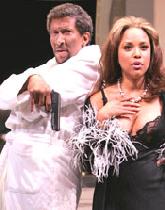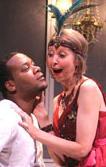SITE GUIDE
SEARCH
REVIEWS
REVIEW ARCHIVES
ADVERTISING AT CURTAINUP
FEATURES
NEWS
Etcetera and
Short Term Listings
LISTINGS
Broadway
Off-Broadway
NYC Restaurants
BOOKS and CDs
OTHER PLACES
Berkshires
London
California
Connecticut
New Jersey
DC
Philadelphia
Elsewhere
QUOTES
TKTS
PLAYWRIGHTS' ALBUMS
LETTERS TO EDITOR
FILM
LINKS
MISCELLANEOUS
Free Updates
Masthead
Writing for Us
A CurtainUp Review
White Chocolate
By Elyse Sommer
| Our races are like these vehicles in which we travel out our lives. Fate is so racial. And the vehicles all look different and travel at different speeds. Do you think Daddy would have made all that money if he hadn't been Jewish? Or short?---Debra . . .who are any of us and who and what are these people we're walking around in? ---Brandon |

Brandon Beale (Reg E. Cathey) & his wife Deborah (Lynn Whitfield) at first react to their African-American selves by rushing for the gun in a night table drawer.
(Photo: Richard Termine)
|
This latest variation on a nightmarish fantasy takes place in a posh Manhattan triplex which James Noone depicts with three eye popping cardboard and real furniture sets . The unanticipated New Look situation comes as a double shock. Not only is the upwardly striving Boston Brahmin Brandon Beale (Reg E. Cathey) transformed but so is his wealthy Jewish wife Deborah (Lynn Whitfield). To complicate the couple's "white chocolate" dilemma (white as usual on the inside, chocolate on the outside and so unrecognized by all, even their daughter) the racial identity switch adds a new risk factor to Brandon's appointment as the Metropolitan Museum of Art's new director -- a post for which he's competing with a "real" African-American, Ashley Brown (Erik Laray Harvey).
White Chocolate is also something of an identity switch for its author, William Hamilton. Though this is not his first play (his biography lists Plymouth Rock, Happy Landing and Interior Design), he's best known as a New Yorker cartoonist. His desire to expand on the ideas that a cartoon must compress into a single visual image and caption is understandable. His aim to develop a fantastical situation into a humorous examination of race and identity in our culture and the ways in which we are shaped by others' perception seems ideally suited to his applying his cartoonist's skills to playwriting.

What's blue-blooded Alice (Julie Halston) doing in the bedroom with Ashley, the man after the Metropolitan Museum's directorship coveted by her brother?
(Photo: Richard Termine)
|
It doesn't really matter that this is not a newly minted premise because the subject of subtle and not so subtle racial prejudice has enough potential to warrant a fresh perspective. White Chocolate moves smartly in the right direction with its art-y New York setting and in the way this rarefied world is used to accommodate an all inclusive skewering of WASP, Jewish, Asian, African-American prejudices -- not to mention attitudes about age, sex and money.
Mr. Hamilton also knows how to toss off funny lines but, alas, the laughs peter out and there are many dead spots; worse still, the characters are too (how else to put it?) cartoonish. Even Julie Halston's scene stealing performance as Vivian, a gut-busting cocktail swilling Eastern Establishment matron, can't overcome the fact that Mr. Hamilton's ability to sustain his premise is incommensurate with his ambition. Much of White Chocolate desperately needs another little splash from Vivian's cocktail shaker to ring in the laughs and realize its more serious social theme without lapses into bad taste.
Still, the goofy eccentricity of the plot and the comic dialogue that does hit the satiric bull's eye are fun to watch and give not just Ms. Halston but her colleagues a chance to flex their comedic muscles. Whitfield and Cathey make a feast out of the Beales' reaction to finding themselves no longer the lily white Manhattanites they were when they went to sleep in their handsome four-poster bed. Whitfield is a feisty and amusing Black Jewish American Princess. Cathey, a fine actor, is less at home with his part Manhattan art crowd, part prep school accent.
Samantha Soule doesn't have much to work with as daughter Louise, a Yale student who feels guilty about the family's wealth but fails to see past her parent's changed skin color. Winston her Asian boyfriend (Paul H. Juhn in a welcome understated performance) who attends Harvard, brings a whole new set of prejudices to the table: Asian to African-American (e.g. Winston to his potential father-in-law: "I didn't have any idea black guys were making enough money to buy stuff like libraries and yachts until the N.B. A. got televised"). . .White to Asian (e.g. Brandon's calling Winston "Wonton" and in in even worse taste asking him if his plans are medicine, businees or " The Law--or perhaps a Law-ndry?"). . .African-American to Asian (as when Erik Laray Harvey's Ashley Brown arrives and assumes Winston is the computer repair man).
David Schweizer, lets the first blackout scene go on too long but his otherwise sure-handed direction strengthens the ensemble work. However, there's no question that one can't praise Julie Halston enough -- especially, since she stepped in for Nora Dunn too late in the show to be properly credited in the program, but not too late, to master large chunks of dialogue as well as to invest her role with her unique talent for priceless physicality and expert timing. Her trajectory from tweedy reserve to unhinged party gal is a master class of comic mood swings -- the first setting off a verbal stream of vitriol about men like her husband who at fifty "suddenly turn eighteen" and leave wives like Vivian to "become like their mother or their Vice-President - a sort of emeritus person.").
White Chocolate has too much failed funny business to be as biting a satire as it could be, but neither is it likely to live up to George F. Kaufman's famous definition: "satire is what closes on Saturday night" Judging from the enthusiastic audience at the performance I attended, Mr. Hamilton's well-intentioned romp is likely to fill the house for quite a few Saturdays.
| WHITE CHOCOLATE Written by William Hamilton Directed by David Schweizer Cast: Reg E. Cathey, Julie Halston, Erik Laray Harvey, Paul H. Juhn, Samantha Soule and Lynn Whitfield Set Design: James Noone Costume Design: David Zinn Lighting Design: David Weiner Sound Design: Robert Kaplowitz Running time: 2 hours and 15 minutes, includes 1 intermission. Century Center for the Performing Arts, 111 East 15 Street,212-239 - 6200 From 9/21/04; opening 10/06/04 . Tuesday through Saturday at 8 PM; Matinees are on Wednesday, Saturday & Sunday at 3 PM. Tickets:e $55 - $60 Reviewed by Elyse Sommer based on 10/04 press performance Closing 1/30/05 |

Retold by Tina Packer of Shakespeare & Co.
Click image to buy.
Our Review

Mendes at the Donmar
Our Review

At This Theater

Leonard Maltin's 2003 Movie and Video Guide

Ridiculous!The Theatrical Life & Times of Charles Ludlam

6, 500 Comparative Phrases including 800 Shakespearean Metaphors by CurtainUp's editor.
Click image to buy.
Go here for details and larger image.



